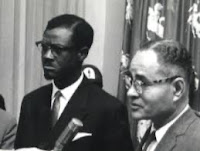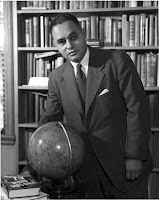 |
| Ralph Johnson Bunche (b. 8/7/1904 - d. 12/9/1971) |
Ralph Johnson Bunche was born in Detroit, Michigan on August 7, 1904 to Olive Agnes and Fred Bunche. His family moved to Toledo, Ohio for a while before returning to Detroit in 1909. In 1914, at the age of 10 years old, Bunche’s family moved to Albuquerque, New Mexico where they hoped the dry weather would improve his parents’ health. Unfortunately, both of his parents died two years after the move to New Mexico. The young Bunche then moved to Los Angeles with his two sisters to live with his grandmother, affectionally called “Nana”, who had been born into slavery. In Los Angeles, Bunche embraced his responsibility within his household, taking on all types of odd jobs while he pursued his education.
THE SCHOLAR
Bunche represented Black Excellence before it became a term of art. In Los Angeles, he graduated as valedictorian of Jefferson High School. By 1927, we find Bunche again earning the distinction of valedictorian — but now as a UCLA college graduate, majoring in international relations. In 1928, he completed his master’s degree at Harvard University in political science. In 1932-33, he was awarded a Rosenwald Fellowship that afforded him the opportunity to conduct research into his dissertation topic comparing the colonial rule of France in the colonies of Dahomey and Togoland.
Upon completing his PhD in political science from Harvard University, Bunche’s dissertation was awarded the Topaz Prize for outstanding research on comparative politics from Harvard University’s Department of Government. Bunche would go on to complete postdoctoral research in anthropology at Northwestern University, the London School of Economics, and Capetown University in South Africa. From 1928 to 1950, he chaired the Department of Political Science at Howard University. From 1950-1952, he taught at Harvard University.
THE CIVIL AND HUMAN RIGHTS ACTIVIST
 |
| Ralph Bunche with Dr. Martin Luther King, Jr. |
In addition to his scholastic work, Bunche was active in both civil rights and human rights movements. In 1936, he published his first book “A World View of Race”, which argued that “race is a social concept which can be and is employed effectively to rouse and rationalize emotions [and] an admirable device for the cultivation of group prejudices.”
Bunche was a member of the so-called Black Cabinet, whom then U.S. president Theododre Roosevelt consulted with on race issues. In 1963, he was present at the March on Washington for Jobs and Freedom, organized by A. Philip Randolph and Bayard Rustin. In 1965, he supported the civil rights march in Montgomery, Alabama, organized by Martin Luther King, Jr. Bunche was known to lend his influence as a speaker and writer to civil rights organizations like the National Association for the Advancement of Colored People.
Bunche was a leading actor in ending colonialism. He helped facilitate the global struggle of colonized nations seeking decolonization from European nations using international institutions like the United Nations. In 1945, Bunche served on the delegations charged with drafting the United Nation’s charter. Much of this work was completed through the United Nation’s Trusteeship Department, which was charged with troubleshooting the decolonization process for many countries in the mid-20th century. He often urged African-Americans to take on positions within the United Nations.
THE NOBEL PEACE PRIZE WINNER
 |
| Ralph Bunche at the United Nations |
From June 1947 to August 1949, the Arab-Israeli conflict had escalated into fighting in Palestine. Bunche is known for his significant service in brokering an armistice agreement between Egypt and what would become the State of Israel. He was initially appointed assistant to the United Nations Special Committee on Palestine, and later as principal secretary of the United Nations Palestine Commission. The commission was charged with carrying out a proposed partition approved by the United Nations General Assembly. The commission worked from the island of Rhodes as their headquarters. The proposed partition fell through, however, and fighting intensified between the Arabs and Jews.
Count Folke Bernadotte was appointed by the United Nations as a mediator in the escalated conflict. Ralph Bunche was appointed to assist Folke.
On September 17, 1948, four months after his appointment, Folke was assassinated in Jerusalem by members of the underground Jewish Lehi group. This was a Zionist paramilitary militant organization that was led by Yitzhak Shamir, whom would become Prime Minister of Israel in 1983. Bunche was named acting United Nations mediator on Palestine, but conducted all of the commission’s affairs from the island of Rhodes.
In 1949, an armistice agreement between Palestine and Israel was brokered after eleven months, which effectively halted the violent Middle East crisis. Bunche returned back to the United States as a hero. On December 10, 1950, he became the first person of African descent to receive a Nobel Peace Prize for his role in brokering the armistice agreement.
THE MEDIATOR
 |
| Ralph Bunche with Patrice Lumumba, former Prime Minister of the Democratic Republic of the Congo |
Bunche served as a mediator in many global conflicts areas. This includes the Sinai (1956), the Congo (1960), Yemen (1963), Cyprus (1964), India-Pakistan war (1965) and Bahrain (1970). In 1971, he retired from the United Nations. Bunche died six months after his retirement. In 2003, UCLA’s Center for African American Studies was renamed after Bunche to commemorate a hundred years since his birth.
“Peace is no mere matter of men fighting or not fighting,” said Bunche. “Peace, to have meaning for many who have known only suffering in both peace and war, must be translated into bread or rice, shelter, health, and education, as well as freedom and human dignity — a steadily better life. If peace is to be secure, long-suffering and long-starved, forgotten peoples of the world, the underprivileged and the undernourished, must begin to realize without delay the promise of a new day and a new life.”



No comments:
Post a Comment